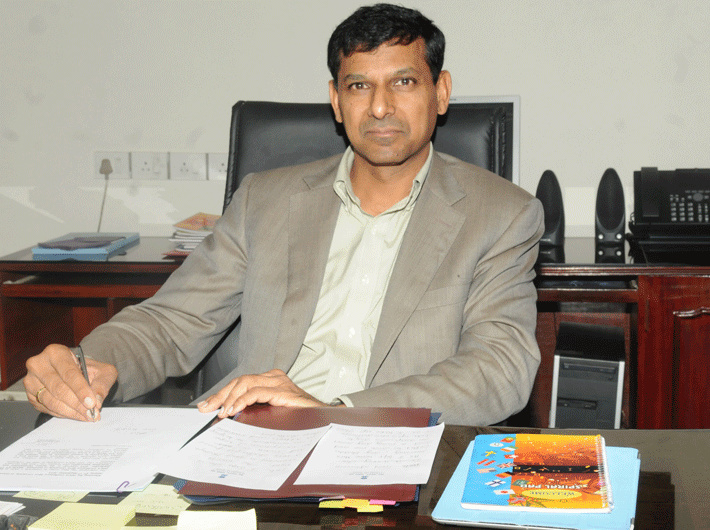Regardless of the differences with BJP on monetary policies, the RBI governor's stepping down could be detrimental to economy
After a bit of a showdown with former Fed chief Ben Bernanke and a few other central bank governors at a conference in Washington, RBI governor Raghuram Rajan could well be headed for some fireworks back home.
While the grapevine is abuzz with talks of Rajan being asked to step down in case the BJP comes to power, the apex bank governor has downplayed the situation dismissing it as media-generated speculation.
The war became public after senior leaders of the party, including the treasurer Piyush Goyal and party ideologue and former cabinet minister Subramaniam Swami, publicly expressed their displeasure at Rajan’s handling of the economic situation.
On Rajan’s hawkish stance of going in for multiple interest rate hikes as a measure to curb inflation, Goyal told The Economic Times that he is “only aggravating the problems and making them worse by increasing interest rates.” In addition Swami spewed more criticism when he said that the BJP could “make it worthwhile for him to leave”.
The statements clearly hint at the BJP’s dislike for Rajan at the helm of affairs at the apex bank and, considering his proximity to finance minister P Chidambaram, may want to replace him.
But are such kinds of speculations and mud-slinging healthy for the economy and market sentiment, both of which had shown an improvement after Rajan took over as RBI governor in September last year?
According to professor R Nagaraj of the Indira Gandhi Institute of Development Research, “Any such dramatic step could destabilise the markets, undermining the credibility of the incoming government.” While he highlights that changes in governments have not affected the office of the RBI governor, he is critical of BJP leaders making such statements. “Political parties should not indulge in such populist talk that weakens the institution of RBI, especially at the current juncture when capital flows are critical for the economy. If political parties have differences with policies suggested by the RBI, they can surely be sorted out by a process of dialogue after the new government is formed,” he said.
In addition, batting for Rajan’s handling of the economic crisis in the country, Atul Sarma, visiting professor at Institute for Human Development said that Rajan had introduced measures which have been conducive to the economy. “He (Rajan) has a very good understanding of both the domestic and global financial markets and steps taken by him have been instrumental in bringing down the current account deficit and strengthening the rupee which had touched a record low level of almost 70 to a dollar before he assumed charge as RBI governor,” Sarma said.
Sarma said that since inflation is supply-driven, Rajan’s logic of tightening monetary supply, by increasing interest rates as a cautionary measure to ensure that no hoarding of goods takes place, makes sense. “When price expectation is high, commodity speculation goes up and it is in such a scenario that people resort to hoarding of goods. In this way, as and when inflation goes through the roof, they sell the hoarded goods at exorbitant prices.”
Asked about the possibility of a BJP-led government removing Rajan from the top job at Mint street, Sarma said that while the government had the full authority to do so, political intervention in the affairs and functioning of the RBI – an independent body – should be kept to a minimum. “It will raise serious questions on the kind of independence the banking regulator enjoys. Also, the markets have been doing really well and Rajan’s sudden exit can destabilise the markets.”
Such comments by political leaders hitting below the belt, Sarma said, is a “kind of lobbying” being done by certain industrial houses. “It is common knowledge that India Inc. has been disappointed with Rajan for going in rate hikes which is hurting their business. Criticism for Rajan’s handling of the economic situation may be a result of some of the corporate houses conniving with political parties to exert pressure on RBI to reduce interest rates. But Rajan knows better than that.”
Another senior economist working with a Delhi-based economics consultancy warned of a negative effect of such a decision not just on the economy but also on the morale of regulators in the country. “He has been taking positive steps towards addressing inflation and he is an economist, so he knows the best how to handle a monetary policy. A regulator should be independent of the political party in power as also the bureaucracy,” the economist said.
However, a chief economist working with a public-sector bank dismissed the speculations saying that they did not have much weight. “Past history strongly suggests that with change in government, the RBI governor may not be changed since there is an element of objectivity and broad-based consensus on his/her appointment.
“If a new government is not happy with the performance of a central banker, the worst case scenario will be that he/she may not get an extension or a second term –like it was the case with Subir Gokarn who did not get an extension for not towing the government’s line of going in for interest rate cuts.”
This is just another episode highlighting the lack of independence regulators in India enjoy, given the high levels of intolerance among our politicos. Doomed if they do and damned if they don’t for all the unpopular yet critical decisions they take.

